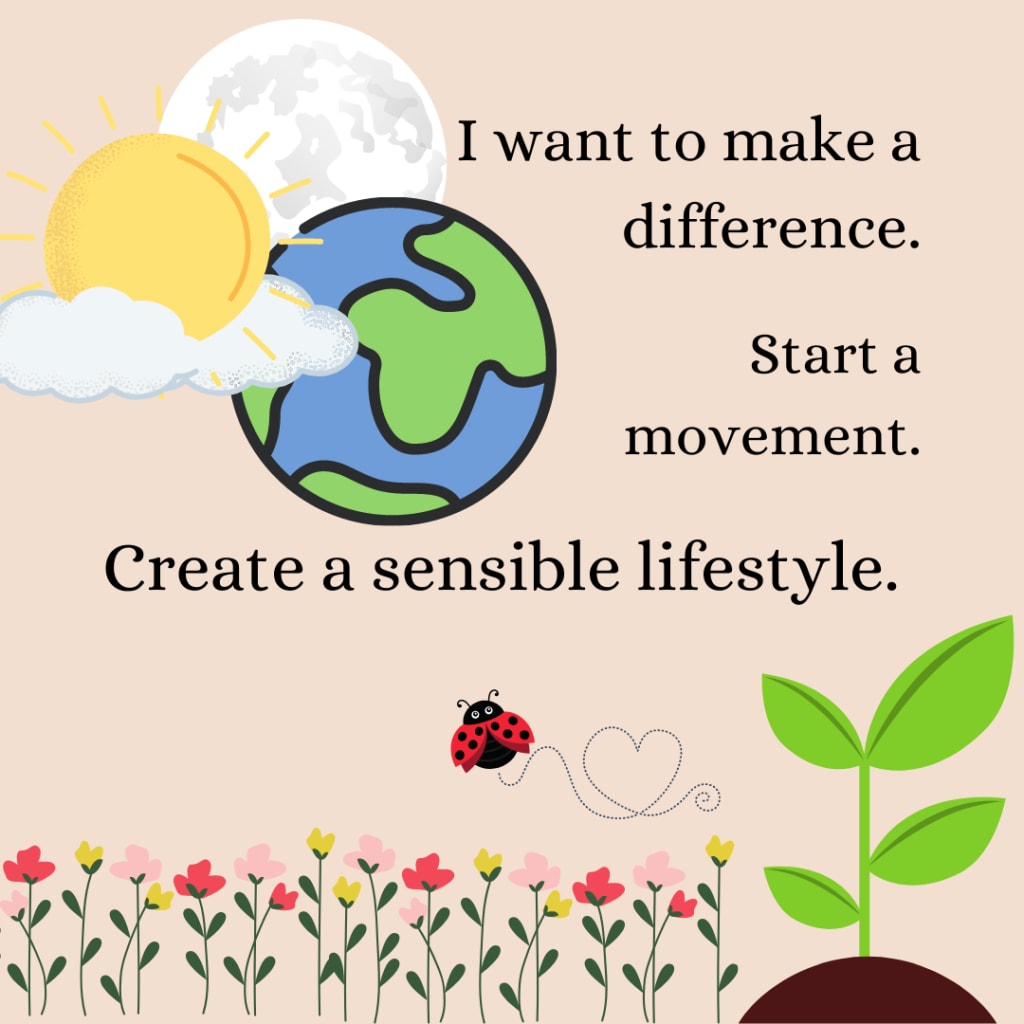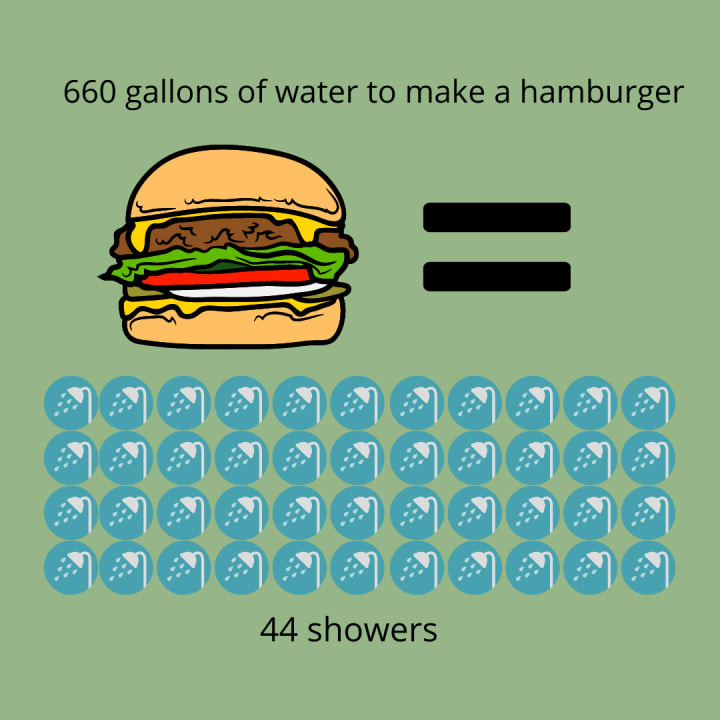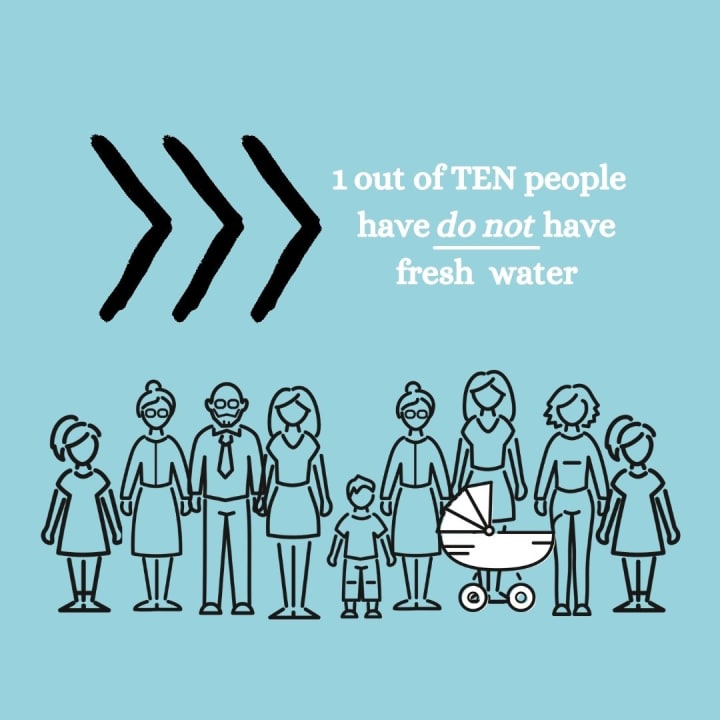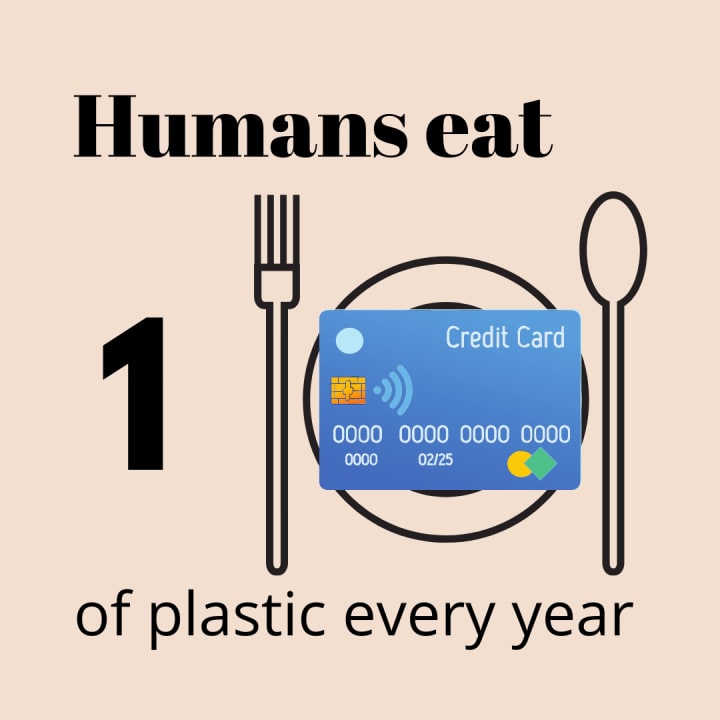Passion for the Earth
Making changes for the better

I am most passionate about saving the planet. You can be too, with the smallest daily lifestyle habits. People follow me because I am able to show them a different view of life. A healthier way of living that can also help the planet. We humans can live however we want. Humans are the first species that are able to live in any place in the world verse animals have to live in a certain place because of the role they play in the ecosystem. Animals in certain areas evolve over time to adapt to the place they live in or they migrate to another area.
It is difficult for us to come to terms with how vital our choices are to the health of the world. We have to first accept that our way of living is unsustainable. We have 7.6 billion people and counting living on this planet and many without the basic needs to survive. Climate change is a very global problem that many people choose to ignore or be ignorant towards. That stops now. We need to open our eyes to what companies are doing and how they are aiding the planet's decline. The customers that buy products are blind to what they are actually supporting; unfair labour practices, land, air and water pollution, harmful chemicals, unethical animal usage and more. We the people have the power to change what these corporations are doing by standing up for humans and animals. In the process, we need to be supporting communities and people for the good they are doing.
The craziest part is that the massive 500 fortune companies actually fund the commercials and create the beliefs within the population that it is the customer's job to dispose of the products' waste. We are told things like, ‘Take quick cold showers to save water’ and 'Turn off the lights when you are not using the room to save energy consumption’, and ‘Reduce your carbon footprint by riding your bike to work’. These small actions are nothing in comparison to how much water, energy, and carbon that these billion-dollar companies use every minute.

Let's just break it down. If you are taking a cold, 5-minute shower but then you are eating a hamburger for lunch, it defeats the purpose of taking a short cold shower. That one hamburger uses 660 gallons of water to make. One shower is approximately 15 gallons of water. If you do the math that one hamburger is equal to 44 showers.
The agriculture that is being done is not innovative and is suffering because they are following the same old habits. Some farmers still till their land before planting crops. They are ripping up the ground complex and fragile ecosystem that goes with it. We are getting rid of forests to grow soy and corn to feed the animals on industrial farms. On those crops, we are spraying harmful chemicals, uses GMOs to make the food bigger, and uses fertilizers. We are creating land that has never in the span of the world been used in this way. We are manipulating it to make it work for more yield to feed more mouths. Pig and cow mouths. The fertilizers also run off into the ocean and create dead zones because the algae grow so much it blocks off the oxygen in the water that the fish need to live.
Then on top of that the way the animals get slaughtered and turned into meat. People are put in jail for killing other people. What makes an animal any different. Killing animals is justified if we eat them? If you kill an animal do you go to jail as well? Are you required to speak to a therapist if you work at a slaughterhouse? Take medication? Are you well? All of this is going against basic animal rights and it is promoting its own sets of behaviours and attitudes within the industry. Slaughterhouses are also really dirty. They pollute the neighbouring towns and tame their freshwater sources. These people who live in the area are unable to have fresh water and grow their own food.

This is not just about what you eat but also about the plastic consumption that we are using without knowing the real consequences. Everything that is made out of plastic is made with oil. The bed you are sleeping on, the pillow you lay your head on, the rug you walk on, the clothes you put on your body, the products in your shower, the toothbrush you use to brush your teeth. Everything is plastic. Now, there is plastic in our food, and in about every single animal in the world!
In the world we live in today, plastic and eating meat is normalized and so is depression, diabetes, heart disease, medicine, etc. They are all connected. We spend a lot of time putting a band-aide over our cuts when we really need to get to the source. People are going to have to want to make the change. Unless a law is passed where people then have to change.
The change to be less wasteful and more resourceful is a change we need to see more of. As much as we see single-use plastic as convenient it is actually toxic for humans and animals. It mimics the basic hormonal chemicals in our bodies and makes us sick. It is time to ban plastic bags, single-use plastics, plastic cutlery, straws, etc. Companies would be able to buy high-quality food if they didn't have to spend money on take-out packaging and single-use plastics. They would also not have to spend money on getting those disposable materials and therefore they would be saving money.

In order to monetize this people need to see garbage as gold. We need to stop using virgin materials and start recycling correctly. We need to see garbage as something we can repurpose many times over. I want to put monetized systems in place that will benefit the communities and the people living in those communities. I want to create more jobs and help the wild animals that are still alive. I want to rebuild forests, preserve land, clean the oceans, create art from garbage, open an animal sanctuary, make my products from recycled material, increase the number of people that care about the world.
Food scrap collector could be another monetized system put in place that will make money. People pay $10 dollars a week to have someone come pick up their food waste. That is $520 dollars a year. That food waste can be turned into animal food or it can be composted back into soil. Both products could be sold, animal food and soil. The soil could be sold for what it is sold for at the regular shops for $13.52. It would be an extra $3 for an eco-friendly bag. A return program would be made on the bag as well. The animal food would go to local people as well unless it is sold in bulk to a farm. This is great because there is no plastic involved and customers are not putting anything in the trash.

Garbage companies are collecting trash and putting it in a landfill or sending it to other countries. Only 9% of the recycling actually gets recycled. So what is in our garbage anyway? Food, paper, plastic, and non-recyclables. We should put systems in place by the towns to create a more organized trash-collecting. Then the companies in the areas buy those materials to create their products with them. For a company that sends a lot of mail. Use recycled material for your envelopes.
Goodwill is a great example of a company that is actually the biggest clothing recycling program around. They sell clothes to other companies by the barrel. Then we just have to trust that they use it all and keep it from landfills. We have to put our trust in companies all around the world for everything that people buy. We have no idea what they are actually doing. But we assume and when the label says all-natural we are gullible to believe it. We also want to believe it because it sounds good.
Restaurants could have a recycling program where the customers get a 10% discount if they bring their own containers. They could also charge an extra $5 to $10 dollars for the containers to offset the harm to the environment. They could put half of the money they get from people paying extra for containers to a litter pick-up program. I would also encourage more vegan and vegetarian choices on their menus to support a more sustainable lifestyle. These small actions would open the eyes of some people to how much trash is really being thrown away. We want to get out of this waste culture world we live in.
Local farmers would organically grow all the produce on their farm and have volunteers help them with gardening. Create a community of plant lovers and people that share common interests. It would bring more education to people about the importance of being outside. School Feild trips could be held and special events. Local farmers could hold classes about gardening and cooking sessions for $35 to $50 a class. They could charge $20 an hour for a house plant check-up. They could sell to local farmers markets and then what they don't sell they could make fresh food to sell.
Local towns should have more community garage sales. It will bring the community together and the town can make money getting people to buy table space. The tables could be $20 for the day or $30 for two days. The people selling their unwanted items will make money and fewer items will go to waste. This is also a way of learning to appreciate items more. We should start to look into why materialism brings us joy.
I want to invest in a furniture company that can upcycle furniture. Say you bought a couch for $150. It cost $150 to fix and now you sold it for $550. That is a $250 profit right there. If you pay someone $20 an hour and it took them 3 hours to fix it, you pocket $190 of that. Understanding the resources and using them to our advantage. Someone is getting rid of all the furniture in their house. They want it gone. Rent a truck, get some people to help, and make some money while doing it.
Cleaning services that use chemical-free cleaning products in glass bottles with homemade ingredients. A clothing company that have factories in the USA or the place of origin. Upcycling unfunctional clothing to cloth products. And so much more!
These small actions would open the eyes of some people to the issues going on in the world. There are a lot of issues that are part of this. As humans, we need to be smart about where we are headed in the future. We want to get out of this waste culture we live in and become the sustainable, loving, fair, healthy place to live for all humans and animals.
Thanks for reading!
About the Creator
Enjoyed the story? Support the Creator.
Subscribe for free to receive all their stories in your feed. You could also pledge your support or give them a one-off tip, letting them know you appreciate their work.






Comments
There are no comments for this story
Be the first to respond and start the conversation.